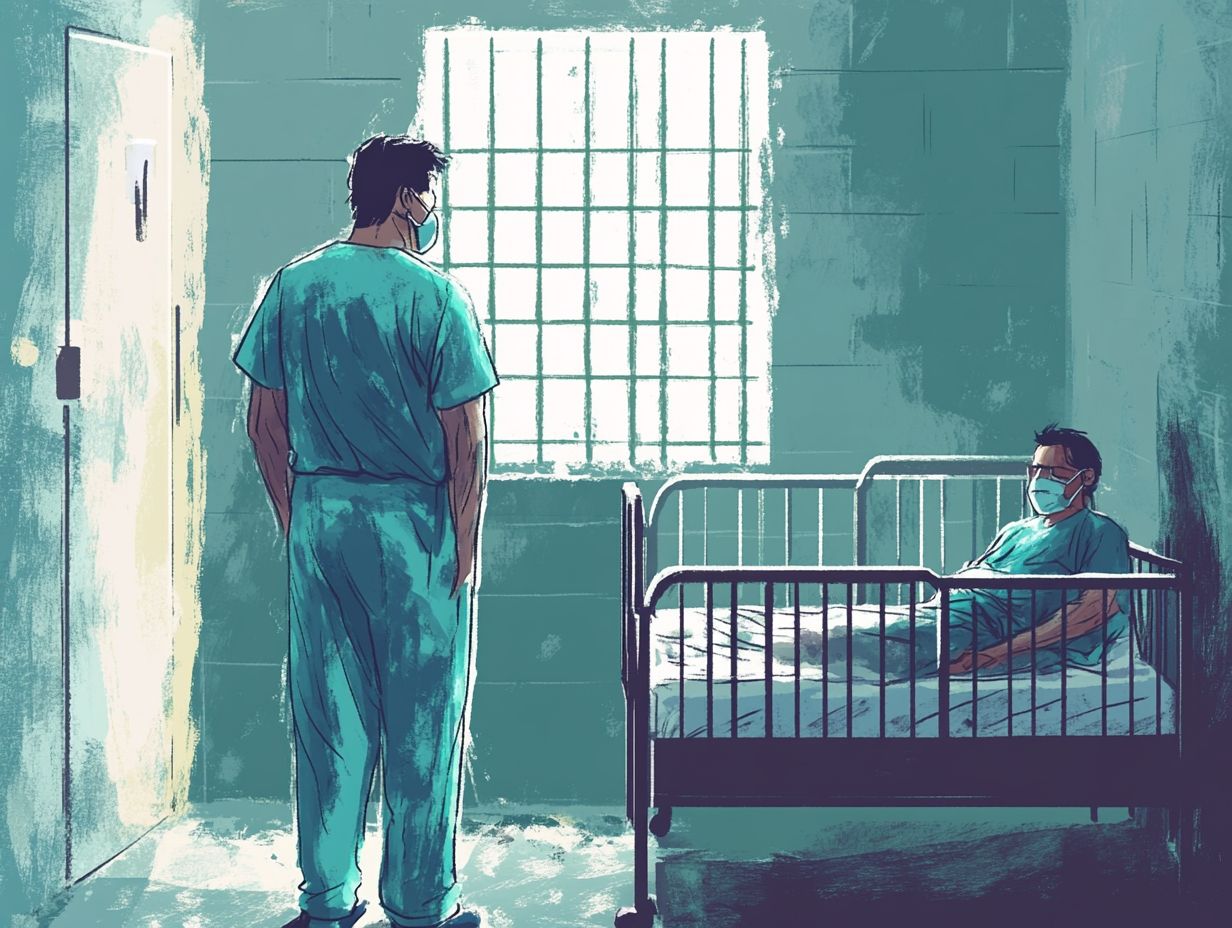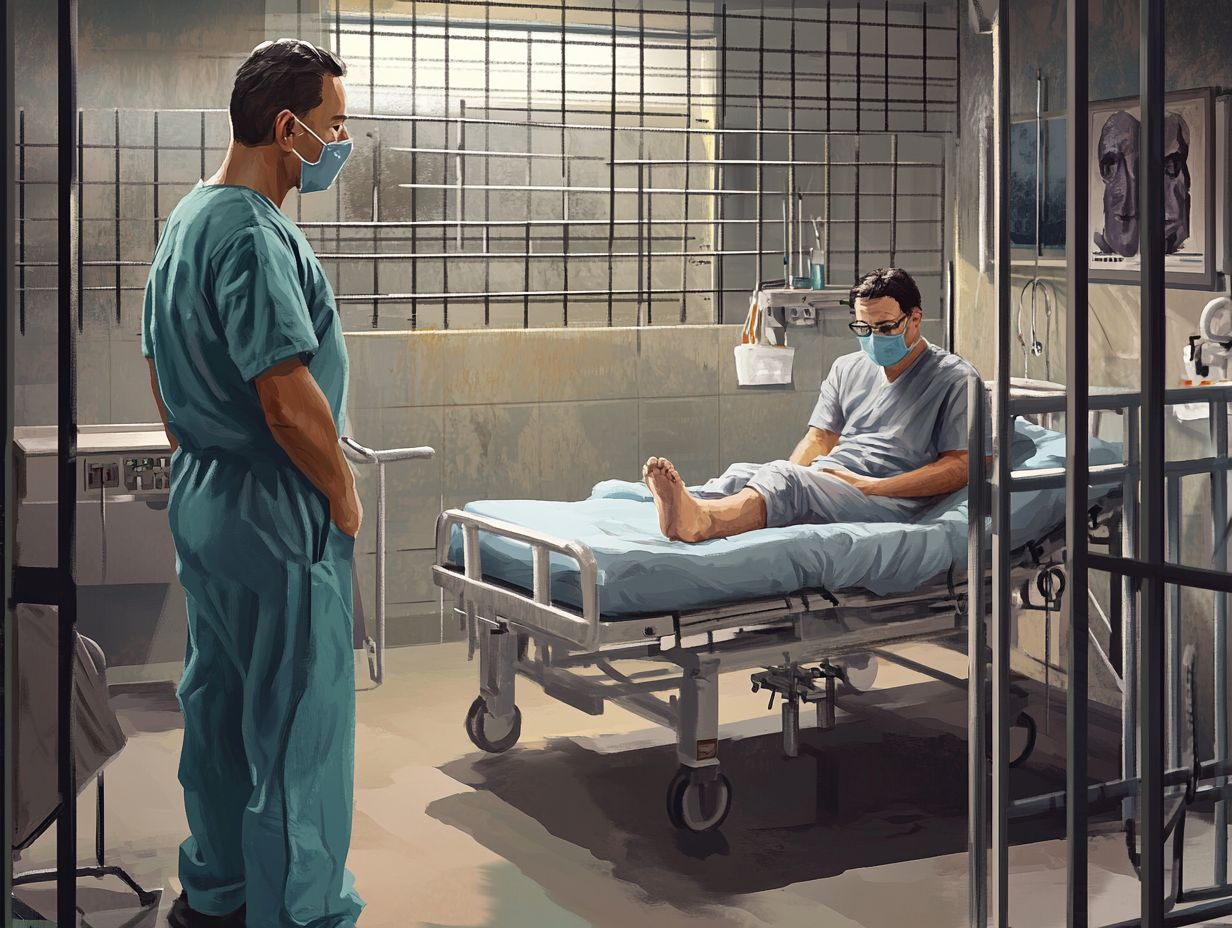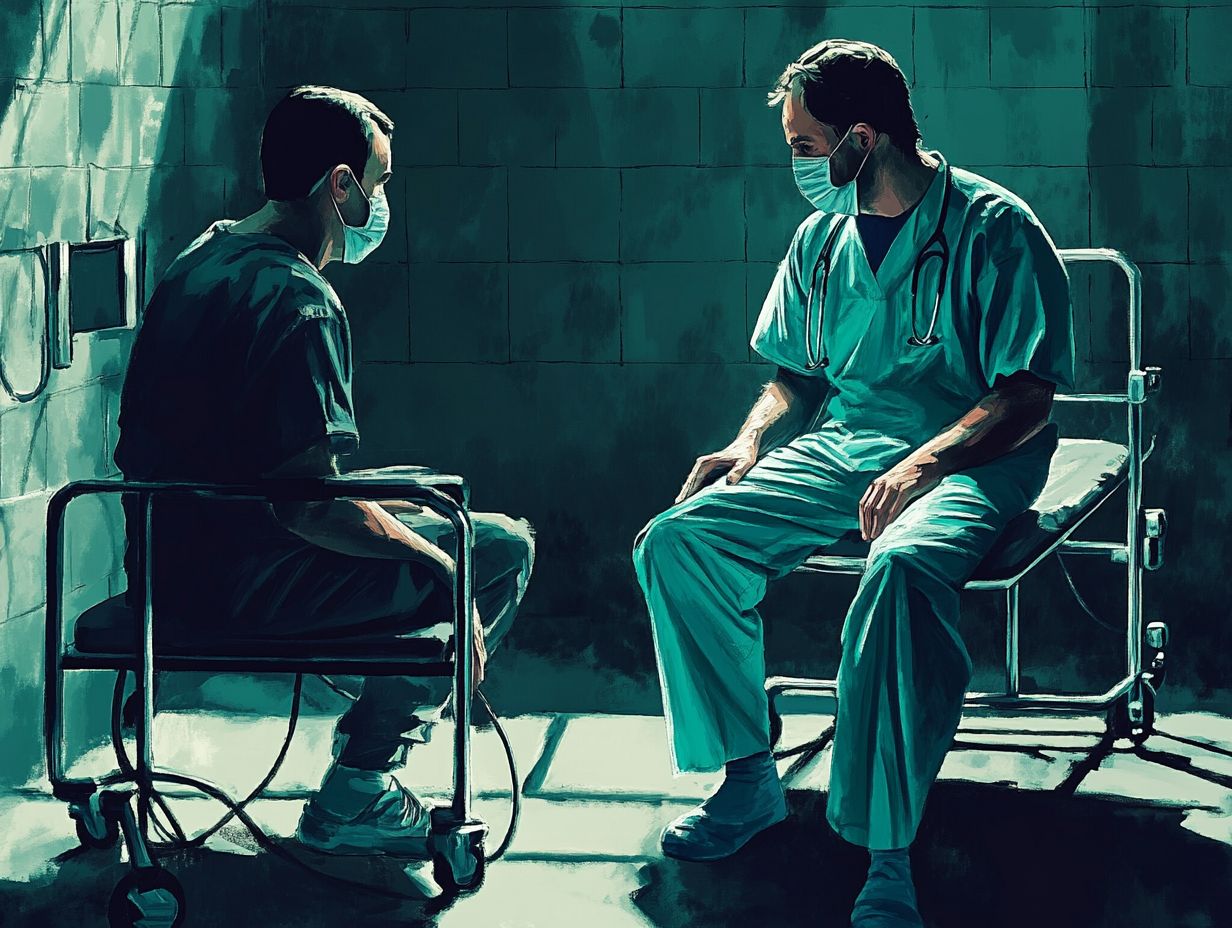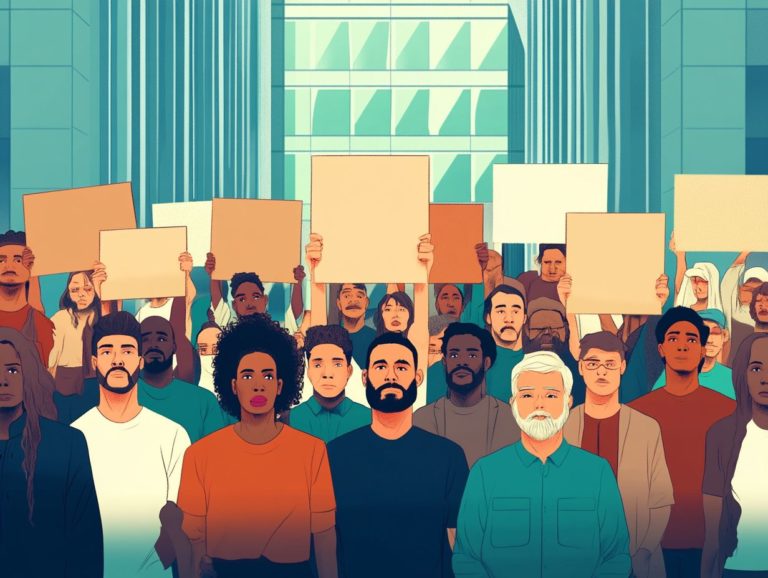The Right to Access Medical Care in Jail
Access to medical care in jail is a fundamental right that often slips through the cracks. Inmates, much like anyone else, deserve proper treatment and care. However, they encounter significant barriers that can hinder their health.
This article delves into what the right to medical care truly means, emphasizing the critical importance of ensuring that inmates receive adequate treatment. You ll discover the various challenges they face and the legal protections that safeguard this right.
If that right is violated, you’ll learn the steps you can take and explore potential solutions to enhance healthcare access in jails. As you read on, you ll gain insights into this vital issue that impacts countless individuals.
Contents
- Key Takeaways:
- Understanding the Right to Access Medical Care in Jail
- The Importance of this Right for Inmates
- Challenges to Accessing Medical Care in Jail
- Legal Protections for Inmates’ Right to Medical Care
- Steps to Take if Your Right to Medical Care is Violated
- Improving Access to Medical Care in Jails
- Frequently Asked Questions
- What is the right to access medical care in jail?
- Who is entitled to the right to access medical care in jail?
- What types of medical care are included in the right to access medical care in jail?
- Can an incarcerated individual be denied medical care in jail?
- What can I do if I am not receiving adequate medical care in jail?
- Are there any limitations to the right to access medical care in jail?
Key Takeaways:
- Every inmate has an undeniable right to medical care.
- This access is vital for preventing serious health issues and ensuring inmates’ well-being.
- If an inmate’s right to medical care is violated, they have legal protections and options to address the issue.

Understanding the Right to Access Medical Care in Jail
Access to medical care in jail is not just a privilege; it’s a fundamental right enshrined in the Eighth Amendment of the U.S. Constitution, which explicitly forbids cruel and unusual punishments.
This right is essential for the health and well-being of inmates, who frequently encounter severe health issues stemming from the conditions of incarceration. The landmark Supreme Court case Estelle v. Gamble made it clear that serious neglect of medical needs is a violation of inmate rights. This underscores the critical importance for correctional facilities to uphold adequate healthcare standards for those in their care.
What is the Right to Access Medical Care?
The right to access medical care means that correctional facilities have a legal obligation to provide adequate healthcare services to inmates, ensuring their medical needs are met in accordance with the Eighth Amendment.
This right means providing not just basic services but also timely, appropriate treatment that emphasizes both the health and dignity of inmates. Legal standards make it clear that any delay or denial of medical care could be seen as cruel and unusual punishment.
Instances of medical negligence can lead to severe consequences, potentially worsening health conditions or even resulting in fatalities. The impact of upholding this right reaches far beyond prison walls, influencing overall health outcomes for incarcerated individuals, supporting their rehabilitation, and ultimately contributing to safer communities when they reintegrate into society.
The Importance of this Right for Inmates
Access to medical care is not just a privilege; it’s a fundamental right for inmates. This access plays a crucial role in shaping their physical and mental well-being, especially for those grappling with chronic illnesses or mental health conditions.
Incarceration often worsens these challenges, making urgent medical care critical.
Ensuring Proper Treatment and Care
Ensuring proper treatment and care for inmates requires adherence to established healthcare standards that dictate the quality and scope of medical services provided in correctional facilities. These standards are vital not only for the well-being of the incarcerated population but also for the overall integrity of the correctional system.
It’s essential to hold healthcare providers accountable, ensuring they meet the rigorous guidelines set forth by national and local regulations. This accountability fosters trust and guarantees that inmates receive timely and appropriate medical attention, including mental health services.
As a correctional health provider, you have the responsibility to remain vigilant in your practices, consistently assessing the needs of the inmate population and adapting your services to effectively address any emerging health concerns. The success of these healthcare systems hinges on collaboration, transparency, and an unwavering commitment to ethical care.
Challenges to Accessing Medical Care in Jail

Accessing medical care in jail presents a multitude of challenges. Various barriers hinder inmates from obtaining timely and adequate healthcare services.
This can create serious health gaps that need urgent attention and worsen overall conditions, underscoring the need for reform in the system.
Barriers to Receiving Medical Treatment
Negligence from healthcare providers creates barriers to treatment in jails. Poor legal guidelines further restrict access to necessary care.
Administrative hurdles complicate these challenges and obstruct timely access to necessary treatment. Many individuals are left without proper care due to these challenges.
The shortage of trained medical staff worsens the situation. Many facilities struggle to recruit and retain qualified professionals because of low funding and inadequate resources.
This personnel deficit limits the quality of care available and leads to prolonged wait times for essential procedures.
To effectively tackle these pressing issues, it s crucial to implement robust policy changes. Adequate funding and comprehensive training programs can foster a better healthcare environment within correctional facilities.
Legal Protections for Inmates’ Right to Medical Care
Legal protections for inmates’ rights to medical care are firmly established through case law and statutes. These provisions ensure that prisoners receive the necessary medical attention.
If violations happen, these laws offer clear paths to legal help. They safeguard the health and well-being of those incarcerated.
Laws and Policies in Place
Numerous laws and policies govern the delivery of medical care in correctional facilities. They focus on establishing healthcare standards for inmate treatment.
These regulations ensure that inmates have access to the necessary medical services, mirroring the care standards provided to the general population.
Rooted in landmark cases and federal mandates like the Eighth Amendment, which prohibits cruel and unusual punishment, these policies emphasize the fundamental human right to healthcare, even while incarcerated.
Implementing these standards requires collaboration among correctional staff, healthcare providers, and legal authorities. This creates a system that prioritizes timely and adequate medical attention.
The impact of these laws is significant. They help combat health disparities and aim to reduce recidivism by addressing underlying medical conditions that can hinder reintegration into society.
Steps to Take if Your Right to Medical Care is Violated
If your right to medical care is compromised while incarcerated, you have several avenues to pursue.
You can file a complaint or a lawsuit to resolve the issue quickly. You can also use legal resources to hold healthcare providers within the correctional facility accountable for their actions.
Filing a Complaint or Lawsuit

Filing a complaint or lawsuit due to inadequate medical care in jail requires a solid grasp of the legal standards governing inmates’ healthcare rights. You must follow the necessary procedures to ensure your claim gets the attention it deserves.
Begin by completing important paperwork. Detail the medical issues you’ve faced, correspondence with medical staff, and relevant medical records.
Be meticulous and thorough these documents will serve as the backbone of your case. Explore options for legal representation, including pro bono services offered by various legal aid organizations. These resources can provide invaluable assistance without the burden of exorbitant costs.
Act quickly, as timelines can differ by location and situation. There are often strict statutes of limitations for filing such claims, so don t let time slip away.
Improving Access to Medical Care in Jails
Improving access to medical care in jails requires targeted solutions and initiatives that address the systemic issues causing health care disparities among incarcerated individuals.
By tackling these underlying factors, we can pave the way for more equitable health care within the correctional system.
Solutions and Initiatives
Various solutions and initiatives are being developed to enhance health care access in jails, focusing on improving health outcomes and addressing the public health consequences of inadequate medical care for inmates.
Programs like the Transitions Clinic Network help individuals transition smoothly from incarceration to effective community health resources, which can notably reduce recidivism the tendency of formerly incarcerated individuals to return to jail.
Emerging partnerships between correctional facilities and local health care providers ensure that inmates receive continuity of care, which is essential for managing chronic conditions such as diabetes and hypertension.
New initiatives focusing on mental health support are gaining momentum. This holistic approach safeguards individual inmate health and promotes overall community health improvements.
This teamwork will help everyone in society.
Frequently Asked Questions
What is the right to access medical care in jail?
The right to access medical care in jail refers to the legal right of incarcerated individuals to receive necessary medical treatment while in custody, including access to doctors, medication, and other health care services.
Who is entitled to the right to access medical care in jail?

All incarcerated individuals, regardless of charges or sentence length, have the right to access medical care in jail. This important right is safeguarded by the Eighth Amendment of the United States Constitution, which prohibits cruel and unusual punishment.
What types of medical care are included in the right to access medical care in jail?
The right to access medical care in jail includes:
- Routine check-ups
- Medication management
- Emergency care
- Referrals to specialists
Can an incarcerated individual be denied medical care in jail?
No, incarcerated individuals cannot be denied medical care in jail. It is the responsibility of the correctional facility to ensure that all individuals in their custody receive necessary medical treatment, regardless of their ability to pay.
What can I do if I am not receiving adequate medical care in jail?
If you are not receiving adequate medical care in jail, you can file a grievance with the facility’s medical department. If the issue is not resolved, reach out to your legal counsel or file a complaint with the appropriate oversight agency.
Are there any limitations to the right to access medical care in jail?
The right to access medical care in jail does have some limitations. For example, non-emergency medical care may be delayed due to security concerns or budget constraints. However, these limitations should not interfere with an individual’s right to receive necessary medical treatment.






